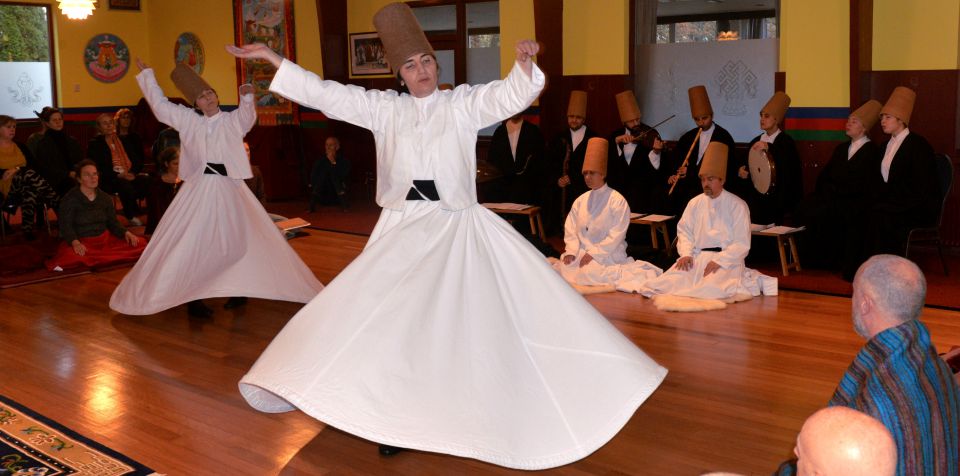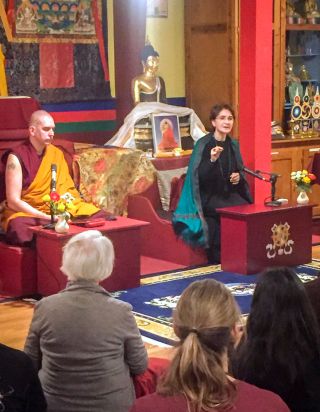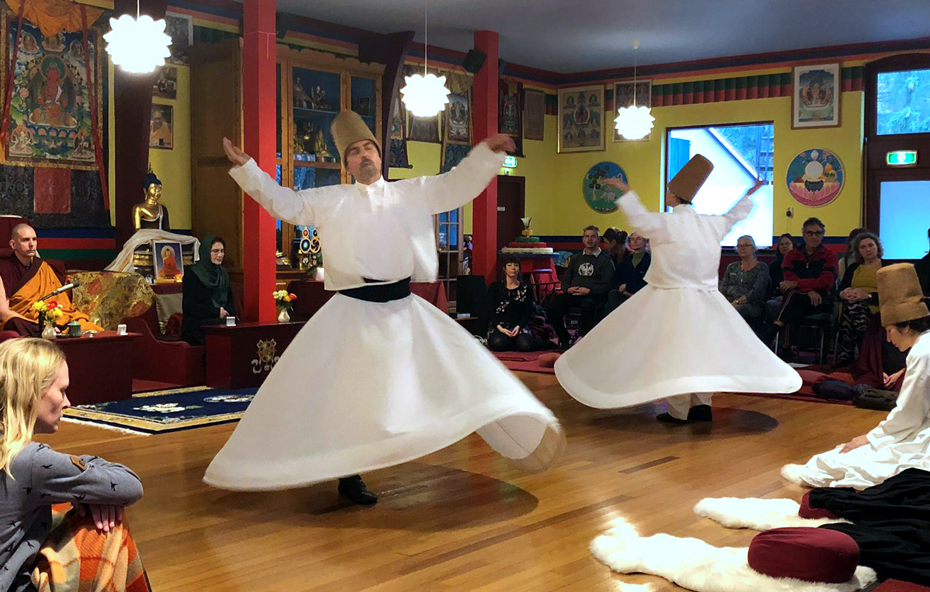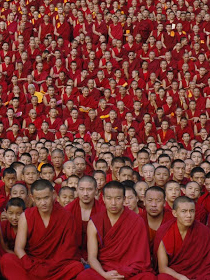- Home
- FPMT Homepage
Foundation for the Preservation of the Mahayana Tradition
The FPMT is an organization devoted to preserving and spreading Mahayana Buddhism worldwide by creating opportunities to listen, reflect, meditate, practice and actualize the unmistaken teachings of the Buddha and based on that experience spreading the Dharma to sentient beings. We provide integrated education through which people’s minds and hearts can be transformed into their highest potential for the benefit of others, inspired by an attitude of universal responsibility and service. We are committed to creating harmonious environments and helping all beings develop their full potential of infinite wisdom and compassion. Our organization is based on the Buddhist tradition of Lama Tsongkhapa of Tibet as taught to us by our founders Lama Thubten Yeshe and Lama Thubten Zopa Rinpoche.
- Willkommen
Die Stiftung zur Erhaltung der Mahayana Tradition (FPMT) ist eine Organisation, die sich weltweit für die Erhaltung und Verbreitung des Mahayana-Buddhismus einsetzt, indem sie Möglichkeiten schafft, den makellosen Lehren des Buddha zuzuhören, über sie zur reflektieren und zu meditieren und auf der Grundlage dieser Erfahrung das Dharma unter den Lebewesen zu verbreiten.
Wir bieten integrierte Schulungswege an, durch denen der Geist und das Herz der Menschen in ihr höchstes Potential verwandelt werden zum Wohl der anderen – inspiriert durch eine Haltung der universellen Verantwortung und dem Wunsch zu dienen. Wir haben uns verpflichtet, harmonische Umgebungen zu schaffen und allen Wesen zu helfen, ihr volles Potenzial unendlicher Weisheit und grenzenlosen Mitgefühls zu verwirklichen.
Unsere Organisation basiert auf der buddhistischen Tradition von Lama Tsongkhapa von Tibet, so wie sie uns von unseren Gründern Lama Thubten Yeshe und Lama Thubten Zopa Rinpoche gelehrt wird.
- Bienvenidos
La Fundación para la preservación de la tradición Mahayana (FPMT) es una organización que se dedica a preservar y difundir el budismo Mahayana en todo el mundo, creando oportunidades para escuchar, reflexionar, meditar, practicar y actualizar las enseñanzas inconfundibles de Buda y en base a esa experiencia difundir el Dharma a los seres.
Proporcionamos una educación integrada a través de la cual las mentes y los corazones de las personas se pueden transformar en su mayor potencial para el beneficio de los demás, inspirados por una actitud de responsabilidad y servicio universales. Estamos comprometidos a crear ambientes armoniosos y ayudar a todos los seres a desarrollar todo su potencial de infinita sabiduría y compasión.
Nuestra organización se basa en la tradición budista de Lama Tsongkhapa del Tíbet como nos lo enseñaron nuestros fundadores Lama Thubten Yeshe y Lama Zopa Rinpoche.
A continuación puede ver una lista de los centros y sus páginas web en su lengua preferida.
- Bienvenue
L’organisation de la FPMT a pour vocation la préservation et la diffusion du bouddhisme du mahayana dans le monde entier. Elle offre l’opportunité d’écouter, de réfléchir, de méditer, de pratiquer et de réaliser les enseignements excellents du Bouddha, pour ensuite transmettre le Dharma à tous les êtres. Nous proposons une formation intégrée grâce à laquelle le cœur et l’esprit de chacun peuvent accomplir leur potentiel le plus élevé pour le bien d’autrui, inspirés par le sens du service et une responsabilité universelle. Nous nous engageons à créer un environnement harmonieux et à aider tous les êtres à épanouir leur potentiel illimité de compassion et de sagesse. Notre organisation s’appuie sur la tradition guéloukpa de Lama Tsongkhapa du Tibet, telle qu’elle a été enseignée par nos fondateurs Lama Thoubtèn Yéshé et Lama Zopa Rinpoché.
Visitez le site de notre Editions Mahayana pour les traductions, conseils et nouvelles du Bureau international en français.
Voici une liste de centres et de leurs sites dans votre langue préférée
- Benvenuto
L’FPMT è un organizzazione il cui scopo è preservare e diffondere il Buddhismo Mahayana nel mondo, creando occasioni di ascolto, riflessione, meditazione e pratica dei perfetti insegnamenti del Buddha, al fine di attualizzare e diffondere il Dharma fra tutti gli esseri senzienti.
Offriamo un’educazione integrata, che può trasformare la mente e i cuori delle persone nel loro massimo potenziale, per il beneficio di tutti gli esseri, ispirati da un’attitudine di responsabilità universale e di servizio.
Il nostro obiettivo è quello di creare contesti armoniosi e aiutare tutti gli esseri a sviluppare in modo completo le proprie potenzialità di infinita saggezza e compassione.
La nostra organizzazione si basa sulla tradizione buddhista di Lama Tsongkhapa del Tibet, così come ci è stata insegnata dai nostri fondatori Lama Thubten Yeshe e Lama Zopa Rinpoche.
Di seguito potete trovare un elenco dei centri e dei loro siti nella lingua da voi prescelta.
- 欢迎 / 歡迎
简体中文
“护持大乘法脉基金会”( 英文简称:FPMT。全名:Foundation for the Preservation of the Mahayana Tradition) 是一个致力于护持和弘扬大乘佛法的国际佛教组织。我们提供听闻,思维,禅修,修行和实证佛陀无误教法的机会,以便让一切众生都能够享受佛法的指引和滋润。
我们全力创造和谐融洽的环境, 为人们提供解行并重的完整佛法教育,以便启发内在的环宇悲心及责任心,并开发内心所蕴藏的巨大潜能 — 无限的智慧与悲心 — 以便利益和服务一切有情。
FPMT的创办人是图腾耶喜喇嘛和喇嘛梭巴仁波切。我们所修习的是由两位上师所教导的,西藏喀巴大师的佛法传承。
繁體中文
護持大乘法脈基金會”( 英文簡稱:FPMT。全名:Found
ation for the Preservation of the Mahayana Tradition ) 是一個致力於護持和弘揚大乘佛法的國際佛教組織。我們提供聽聞, 思維,禪修,修行和實證佛陀無誤教法的機會,以便讓一切眾生都能 夠享受佛法的指引和滋潤。 我們全力創造和諧融洽的環境,
為人們提供解行並重的完整佛法教育,以便啟發內在的環宇悲心及責 任心,並開發內心所蘊藏的巨大潛能 — 無限的智慧與悲心 – – 以便利益和服務一切有情。 FPMT的創辦人是圖騰耶喜喇嘛和喇嘛梭巴仁波切。
我們所修習的是由兩位上師所教導的,西藏喀巴大師的佛法傳承。 察看道场信息:
- FPMT Homepage
- News/Media
-
- Study & Practice
-
-
- About FPMT Education Services
- Latest News
- Programs
- New to Buddhism?
- Buddhist Mind Science: Activating Your Potential
- Heart Advice for Death and Dying
- Discovering Buddhism
- Living in the Path
- Exploring Buddhism
- FPMT Basic Program
- FPMT Masters Program
- FPMT In-Depth Meditation Training
- Maitripa College
- Lotsawa Rinchen Zangpo Translator Program
- Universal Education for Compassion & Wisdom
- Online Learning Center
-
- Prayers & Practice Materials
- Overview of Prayers & Practices
- Full Catalogue of Prayers & Practice Materials
- Explore Popular Topics
- Benefiting Animals
- Chenrezig Resources
- Death & Dying Resources
- Lama Chopa (Guru Puja)
- Lama Zopa Rinpoche: Compendium of Precious Instructions
- Lama Zopa Rinpoche: Life Practice Advice
- Lama Zopa Rinpoche Practice Series
- Lamrim Resources
- Mantras
- Prayer Book Updates
- Purification Practices
- Sutras
- Thought Transformation (Lojong)
- Audio Materials
- Dharma Dates - Tibetan Calendar
- Translation Services
- Publishing Services
- Ways to Offer Support
- Prayers & Practice Materials
-
- Teachings and Advice
- Find Teachings and Advice
- Lama Zopa Rinpoche Advice Page
- Lama Zopa Rinpoche: Compendium of Precious Instructions
- Lama Zopa Rinpoche Video Teachings
- ༧སྐྱབས་རྗེ་བཟོད་པ་རིན་པོ་ཆེ་མཆོག་ནས་སྩལ་བའི་བཀའ་སློབ་བརྙན་འཕྲིན།
- Podcasts
- Lama Yeshe Wisdom Archive
- Buddhism FAQ
- Dharma for Young People
- Resources on Holy Objects
- Teachings and Advice
-
-
*If a menu item has a submenu clicking once will expand the menu clicking twice will open the page.
-
-
- Centers
-
- Teachers
-
- Projects
-
-
-
-
*If a menu item has a submenu clicking once will expand the menu clicking twice will open the page.
-
-
- FPMT
-
- Shop
-
-
-
The Foundation Store is FPMT’s online shop and features a vast selection of Buddhist study and practice materials written or recommended by our lineage gurus. These items include homestudy programs, prayers and practices in PDF or eBook format, materials for children, and other resources to support practitioners.
Items displayed in the shop are made available for Dharma practice and educational purposes, and never for the purpose of profiting from their sale. Please read FPMT Foundation Store Policy Regarding Dharma Items for more information.
-
-
4

Sufi dervish dancers during an interfaith compassion retreat, Maitreya Instituut Loenen, November 2018. Photo courtesy of Maitreya Instituut.
Maitreya Instituut in the Netherlands hosted an interfaith dialogue that transcended the usual exchange of words. Buddhist and Sufi students came together to learn about each other’s traditions and to practice during a four-day retreat focused on compassion.
Interfaith activities are one of FPMT’s five pillars of service. Maarten de Vries, assistant director of Maitreya Instituut Loenen, describes the special event that took place in late 2018.
All human beings are like the various organs of a body. In the universe, everything is created as interdependent and in need of each other. Consequently, the one who has hurt another actually has hurt himself, and done himself great harm! — Rūmī, 13th-century Persian Sufi mystic
Just as the body, which has many parts owing to its division into arms and so forth, should be protected as a whole, so should this entire world, which is differentiated and yet has the nature of the same suffering and happiness. I should eliminate the suffering of others because it is suffering, just like my own suffering. I should take care of others because they are sentient beings, just as I am a sentient being. — Shantideva, 8th-century Indian Buddhist monk and scholar1

Ven. Losang Gendun and Sheikha Nur Artıran during an interfaith compassion retreat, Maitreya Instituut Loenen, Netherlands, November 2018. Photo courtesy of Maitreya Instituut.
In November 2018, Maitreya Instituut Loenen in the Netherlands organized a four-day retreat lead by Sheikha Nur Artıran, president of the Şefik Can International Mevlânâ Education and Culture Foundation in Istanbul, Turkey, and Ven. Losang Gendun, FPMT resident teacher of Maitreya Instituut Amsterdam. The purpose of the interfaith retreat was to create a space for a participatory dialogue between Islamic Sufism and Tibetan Buddhism, not through mere theological debate, but through the sharing of spiritual practice and bonds of friendship.
The theme “compassion” was approached through Buddhist meditation, Sufi contemplations, mantra and dhikr2 recitation, discussions, and aspirational prayer. Moreover, Nur’s group of dervishes performed sama, the famous swirling ritual done by Mevlevi Sufis following their founder Jalāl ad-Dīn Rūmī. The retreat was attended by thirty-five people from both communities and interested others.
“Nur and I met six years ago in Toulouse, France. We were invited by the Sufi organization Association Internationale Soufie Alâwiyya (AISA),” Ven. Gendun said. “Where many interreligious dialogues tend to carefully tread around sensitive subjects or become apologetic, our first conversation was uninhibited and frank. During Nur’s lecture I was struck by the amount of citations from Rūmī that have counterparts in Shantideva’s Bodhicaryavattara (A Guide to the Bodhisattva’s Way of Life). That realization set the tone of our ensuing and enduring conversations.
“Two months later, our first breakfast together in her community’s dargah in Istanbul, consisted of a three-hour long exchange on a broad range of topics. To the amusement of the people attending, every ‘Shantideva states’ was followed by a ‘Rumi says’—a format that the retreatants in Loenen are now well familiar with.
“During that first visit to Istanbul, Nur remarked how little authentic Buddhism exists there and went ahead to organize an occasion for me to lecture. From the start our relationship has been one not only of cooperation, but of participation, and so to lead a retreat together in Loenen was the natural result of six years of friendship and exchange.”

Participants of the interfaith compassion retreat at Maitreya Instituut Loenen, Netherlands, November 2018. Photo by Tülin Mevlana.
A person who lives according to the wishes and desires of his soul is like a dry leaf. Such people are swept up by the winds of every fancy and craving. However, people who are aware of the higher Divine power within themselves are like a high mountain. Is it possible for such a person to disperse in the winds of wish and desire? — Rūmī
Just as a plantain tree decays upon losing its fruit, so does every other virtue wane. But the tree of the Spirit of Awakening perpetually bears fruit, does not decay, and only flourishes. — Shantideva
There was a conference in Amsterdam, which was well attended, that preceded the compassion retreat. Very appropriately, a large delegation of the Dutch AISA community joined the conference and dedicated the evening with extensive recitations.
A sizable group of dervishes from Nur’s community and a large group of students from the Matireya Instituut center in Amsterdam went on to do the retreat in Loenen. The mornings opened with meditations on the four immeasurable thoughts and bodhichitta, followed by similar contemplations led by Sheikha Nur after breakfast.This was followed by an exploration of the Tara and Chenrezig mantras, and of the Sufi dhikr. Instruction was given on how to meditate on them, interspersed with communal chanting.
Without my foreknowledge, the dervishes had prepared a melody for the Tara mantra and lead us in its recitation accompanied by guitar and sitar. The rest of the days were spent contemplating, meditating on, and discussing various topics—such as impermanence and mortality, interdependence and selflessness, and love and guru devotion—from the perspectives of our respective traditions, not as arguments, but trying to substantiate and complement each other.
Saturday provided the highlight of the retreat with a breath-taking demonstration of sama, the musical ceremony of whirling dervishes, recounting the qualities of the prophets and Allah. Clothed in black funerary robes, signifying the ego’s death, the dervishes circumambulate their teacher as planets do the sun.

Sufi dervish dancers during the retreat, Maitreya Instituut Loenen, November 2018. Photo courtesy of Maitreya Instituut.
An aspect of the dervish’s training that comes remarkably close to the tantric practice of pure view is to perceive all things as manifestations of the divine, and all utterances as those of their sheikh, realizing that our suffering perspective is merely caused by our own ignorance of the true nature of things. Moreover they avoid the pronoun “I” and substitute it with “faqhir,” the poor and humble one, comparable to bhikshu or “beggar,” while addressing others with “can,” “beloved” or “soul.” This obviously opened fertile avenues to discuss. The final morning saw Shantideva’s famous argument for exchanging self and other broached, which seemed appropriate for the occasion.
An additional benefit of the retreat was the opportunity afforded to our two communities to meet, exchange and bond, in the hope of bringing them closer and undertaking more future initiatives together. Much like a what French feminist and intellectual Simone de Beauvoir said: it is in the face of the other that we truly get to see ourselves.
The retreat manifested my hope that our intimate way of sharing our spirituality would open the hearts of the participants to enjoy the specialness of their own lineage. And do this with freedom from grasping at it as an identity, but instead rejoice and participate in the beauty of a sister tradition. To share the fire of our candle never diminishes the light, the Buddha said.

Ven. Losang Gendun and Sheikha Nur Artıran during the interfaith compassion retreat, Maitreya Instituut Loenen, Netherlands, November 2018. Photo by Tülin Mevlana.
The retreat will become an annual event in the Netherlands and also will be hosted in France. Hopefully we can organize them soon in Turkey as well. We are working on translations of comparative selections from the works of Rūmī and Shantideva to support these efforts.
One participants said, “Such an interreligious way of working in a retreat has, in my opinion, really added value for both communities and for our spiritual work in the broad sense. This retreat goes further than what you often see at interreligious meetings, where one just brings forward thoughts from one’s own tradition. We went much further and built something together from a shared inspiration and intention. That was my impression. It seems more like an interreligious session as it once happened in a certain period of the Moghul electorate in India.”
Another participant reflected, “In these times where the world is rapidly and scarily heading towards ever more polarization and aggression against the ‘other,’ the coming together of these two traditions through teachers like Sheikha Nur Artıran and Ven. Losang Gendun is a hopeful beacon of energy, light, and above all love.”
We are the remedy of all problems, relief of the helpless. We are like the Sun on this Earth. We have come to give life to all, to be beneficial and helpful to the whole humanity. To be friendly to the people whose hearts have been broken and become destitute; We came to share their sadness and grief. We are born to bring them, who have fallen into contempt, who fell on the ground, and those who were disregarded, to the rose garden and grant them mirth. We are not the property of a few people, like gold. We are like oceans, mines; we are the property of everyone who live in this world. — Rūmī
A well-intentioned person who thinks, ‘I shall eliminate the headaches of sentient beings,’ bears immeasurable merit. What then of a person who desires to remove the incomparable pain of every single being and endows them with immeasurable good qualities? He satisfies with all joys those who are starving for happiness and eliminates all the sorrows of those who are afflicted in many ways. He dispels delusion. Where else is there such a Saint? Where else is there such a friend? Where else is there such merit? — Shantideva
1. The quotes from Rūmī were translated by Şefik Can International Mevlânâ Education and Culture Foundation. Quotes from Shantideva were taken from the translation of the Bodhicaryavattara by Vesna and Alan Wallace.
2. Dihkr may be short phrases or prayers that are repeatedly recited, similar to Buddhist mantras.
For more, visit Maitreya Instituut online; also, read other stories about Interfaith activities within FPMT.
- Home
- News/Media
- Study & Practice
- About FPMT Education Services
- Latest News
- Programs
- New to Buddhism?
- Buddhist Mind Science: Activating Your Potential
- Heart Advice for Death and Dying
- Discovering Buddhism
- Living in the Path
- Exploring Buddhism
- FPMT Basic Program
- FPMT Masters Program
- FPMT In-Depth Meditation Training
- Maitripa College
- Lotsawa Rinchen Zangpo Translator Program
- Universal Education for Compassion & Wisdom
- Online Learning Center
- Prayers & Practice Materials
- Overview of Prayers & Practices
- Full Catalogue of Prayers & Practice Materials
- Explore Popular Topics
- Benefiting Animals
- Chenrezig Resources
- Death & Dying Resources
- Lama Chopa (Guru Puja)
- Lama Zopa Rinpoche: Compendium of Precious Instructions
- Lama Zopa Rinpoche: Life Practice Advice
- Lama Zopa Rinpoche Practice Series
- Lamrim Resources
- Mantras
- Prayer Book Updates
- Purification Practices
- Sutras
- Thought Transformation (Lojong)
- Audio Materials
- Dharma Dates – Tibetan Calendar
- Translation Services
- Publishing Services
- Teachings and Advice
- Find Teachings and Advice
- Lama Zopa Rinpoche Advice Page
- Lama Zopa Rinpoche: Compendium of Precious Instructions
- Lama Zopa Rinpoche Video Teachings
- ༧སྐྱབས་རྗེ་བཟོད་པ་རིན་པོ་ཆེ་མཆོག་ནས་སྩལ་བའི་བཀའ་སློབ་བརྙན་འཕྲིན།
- Podcasts
- Lama Yeshe Wisdom Archive
- Buddhism FAQ
- Dharma for Young People
- Resources on Holy Objects
- Ways to Offer Support
- Centers
- Affiliates Area
- Teachers
- Projects
- Charitable Projects
- Make a Donation
- Applying for Grants
- News about Projects
- Other Projects within FPMT
- Support International Office
- Projects Photo Galleries
- Give Where Most Needed
- FPMT
- Shop
Translate*
*powered by Google TranslateTranslation of pages on fpmt.org is performed by Google Translate, a third party service which FPMT has no control over. The service provides automated computer translations that are only an approximation of the websites' original content. The translations should not be considered exact and only used as a rough guide.Look at modern society. Many people put themselves down; that’s their worst problem. You can see this everywhere in the world; people put limitations on themselves, on their own reality.








